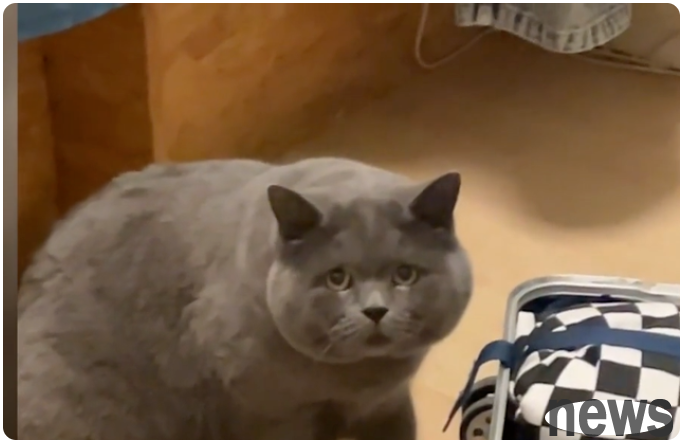The cats on the Internet are in various shapes, but have you ever seen a cat that forgets its owner? There was a video shared by a Beijing netizen a while ago that caused heated discussion among netizens. She went back to her hometown to celebrate the New Year and left the blue cat alone at home. When she got home, the blue cat forgot her, stared at her with big eyes, as if saying: Who are you? Why are you coming to my house?

It is reported that this cat is 6 years old this year. He is usually very brave and has a good memory. During the Chinese New Year, the owner went back for a week. After returning, although the cat was in good health, it might be a little scared that it did not recognize the owner directly. But many netizens left messages saying that the cat's ignorant expression when he saw his owner again was so cute. Some netizens also said: "Cats really forget their owners. There is one in my family. A pair of big cats in the family gave birth to a nest last year, leaving behind a cub that was not in good health. This cub is very clingy and jumping around every day, and is very cute. But if my family travels on a business trip and goes home for a few days, this cub really doesn't remember people. It's the same as hiding all over the room as seeing strangers. You have to live with it peacefully for about a long time before it won't hide. But its parents are normal." Experts analyzed that if the cat forgets its owner, it can explain three things: the cat has a poor memory and the owner is not good enough to the cat, but it is not bad either. Because research has found that the things that cats remember the deepest and longest time are usually related to very beautiful or very painful events. Pet health website "PetMD" says that cats' memories are divided into short-term memory and long-term memory. Qiliang, most memories are short-term memories, which can help cats solve their survival problems. Especially when it comes to food, cats usually use short-term memory to remember where to find prey or food. Cats also connect food supply to a certain interval of the day through their own biological clock. The retention time of a cat's short-term memory ranges from 1 minute to 24 hours, usually 16 hours, but if it is repeated continuously, it may be converted into long-term memory. If you often open canned cats for feeding, in the end, no matter where you are, just open the canned food and the cat will come to you.
Based on past experience, cats are not uncommon for favors or dislikes of certain people because they best remember the preferential treatment or abuse they have encountered. Experts believe that the longest memories of a pet are usually very positive or very negative events, such as issues related to food and survival safety, as well as events with emotional impact. You may notice cats react negatively to specific odors, sights, or other stimuli. For example, a cat that has been bullied by a dog will subconsciously run away as soon as it sees the dog. Cats may also be depressed because of death from other cats or close humans, resulting in loss of appetite, urination and defecation everywhere, and even attacking humans. If you don’t want your cat to forget you in a few days, you must keep treating it well, feeding the cat, playing with it, and forming a habit. Cats are inertial animals, so you will become an essential part of their lives, and once you are away, the cat will look for and miss you.
Cats' memory will decrease with their age, because the number of brain cells is decreasing, and cats will also suffer from feline cognitive dysfunction, which is about 50% of cats aged 11 to 15 and 80% of cats aged 16 to 20. It is important to provide them with foods rich in antioxidants and omega-3 fatty acids.